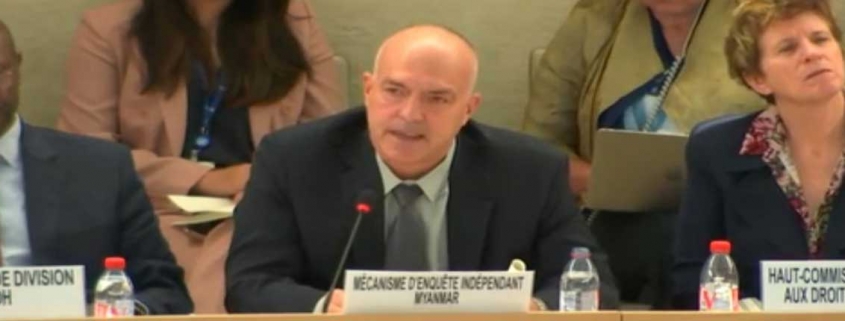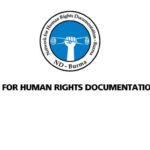Myanmar Mechanism calls for continued support of international community in the accountability efforts
Geneva, 14 September 2020 – In his second annual report to the United Nations Human Rights Council, the Head of the Independent Investigative Mechanism for Myanmar (Mechanism) outlined the significant progress that the Mechanism has made in its first full year of existence and repeated his call on Member States to continue supporting the Mechanism’s mission.
“We understand the deep importance of accountability for victims of crimes in Myanmar,” Nicholas Koumjian said. “We are committed to fulfil our role in this process, but we cannot do this alone. We need the continued support of all parts of the international community, in particular Member States in the region, in order for the Mechanism to fully achieve the purpose for which it was created.”
While the Mechanism has been able to use innovations and technology to engage with relevant stakeholders and collect evidence, it also continues to reach out to the Government of Myanmar to seek access to relevant information. By conducting its evidence collection efforts objectively and professionally, the Mechanism hopes to convince all that only those responsible for crimes have anything to fear from the Mechanism.
Mr. Koumjian highlighted that the mandate of the Mechanism is ongoing. “[…] we are closely following events in Myanmar and reports of violence that might qualify as war crimes and crimes against humanity,” he said. “We are watching and those perpetrating violence should know that evidence is being recorded and preserved.”
The statement referenced resolution 43/26 of 22 June 2020, in which the Human Rights Council called for close and timely cooperation between the Mechanism and any future investigations by national, regional or international courts, including by the International Criminal Court and the International Court of Justice. Mr. Koumjian reported that, in response to requests, the Mechanism has been sharing appropriate information with The Gambia and Myanmar, Parties to the ongoing proceedings before the International Court of Justice.
Mr. Koumjian outlined the progress made by the Mechanism since its last report, in circumstances marked by the global COVID-19 pandemic. This included building a team and infrastructure capable of implementing the challenging mandate that the Mechanism has been given – to collect, preserve and analyse evidence relating to the most serious international crimes and violations of international law committed in Myanmar since 2011 and to build case files that address individual criminal responsibility.
In addition to this, the Mechanism has made public outreach a priority to promote greater understanding of the complex work of the Mechanism, and to raise awareness of the Mechanism’s accountability mandate with the aim of deterring perpetrators from committing new crimes.
Mr. Koumjian concluded his statement by assuring stakeholders of the Mechanism’s commitment to fulfilling its role in accountability processes for crimes committed in Myanmar.
“Perhaps my most memorable moment with the Mechanism was meeting with victims and community representatives in Cox’s Bazar last November. They told me how their families were affected by the violence they experienced and of their desire for justice,” said Mr. Koumjian. “They all stated that they wanted to return to their homes but only once it was safe to do so. I believe an essential step to a safe and voluntary return of refugees is an end to impunity for those responsible for violence.”
Read the full statement here: https://iimm.un.org/?p=1915
The presentation of the report will be followed by an interactive dialogue with States and civil society.
ND Burma
ND-Burma formed in 2004 in order to provide a way for Burma human rights organizations to collaborate on the human rights documentation process. The 13 ND-Burma member organizations seek to collectively use the truth of what communities in Burma have endured to advocate for justice for victims. ND-Burma trains local organizations in human rights documentation; coordinates members’ input into a common database using Martus, a secure open-source software; and engages in joint-advocacy campaigns.
Recent Posts
- Executive Director: Statement on UNOPS operations in Myanmar
- Support Myanmar’s displaced communities through border-based aid and legal protection – Stop the Myanmar military junta’s atrocities fueling mass displacement
- Myanmar flood submerges Ponngyun IDP camp, displacing over 1,000 and triggering urgent need for aid
- Airbus divests from Chinese arms company following global campaign
- Crimes Against Humanity



